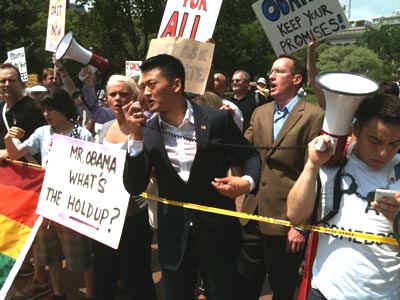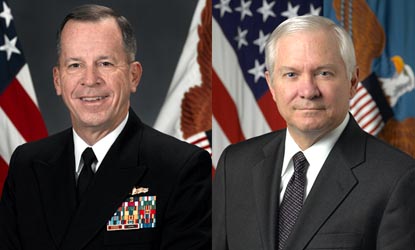News Analysis: DADT's State of Play
Gay leaders may have sought a ''game change,'' but Friday's flurry of activity left the strategy and tactics of DADT repeal unclear
by Chris Geidner
May 3, 2010
On Friday afternoon, April 30, at a little past 4 p.m., the Associated Press’s Anne Flaherty posted a brief story that the secretary of defense opposed legislative action on the ”Don’t Ask, Don’t Tell” policy until after the Pentagon completed its review of how to implement repeal of the policy.
The letter sent from Defense Secretary Robert Gates and Chairman of the Joint Chiefs of Staff Adm. Mike Mullen – although his inclusion on the letter was not noted in the initial AP report – to House Armed Services Committee Chairman Ike Skelton (D-Mo.) was the spark that ignited several months’ worth of kindling.
What’s more, Skelton asked for it.

Lt. Daniel Choi speaks at May 2 Get Equal rally, with James Pietrangelo behind him
(Photo by Chris Geidner)
The executive director of Servicemembers Legal Defense Network (SLDN), Aubrey Sarvis, told the more than 100 people gathered at Lafayette Park on Sunday, May 2, that there was ”no profile in courage Friday night” from the White House in its response to the Gates and Mullen letter. And, yes, there were more arrests on Sunday, as the number of people who have handcuffed themselves to the White House fence protesting presidential action – or inaction – on DADT doubled to 12.
But, removed from the responses and protests, the underlying facts are that a committee chairman who has said he opposes repeal asked Gates a question that the secretary had previously answered. Although Friday’s response was more detailed — and, some have argued, less based in fact — his view that Congress should wait on the Pentagon is not new. Gates told reporters on March 25, ”I do not recommend a change in the law before we have completed the study.”
So, why the fire?
In part, the White House response to the letter led to this point. But even before the White House statement came out at 7 p.m. Friday, those fighting for repeal were up in arms.
The past 72 hours fell on a weekend – a weekend when the Washington press corps were focused on the celebratory glitz of the White House Correspondents’ Association annual dinner. But examining the timeline offers some clues as to why and how this happened.
Within an hour of the AP report going up, Metro Weekly and several other media outlets obtained a copy of the letter from unidentified sources. Most of the outlets also reported receiving a copy of the two-sentence letter sent on April 28 from Skelton to Gates that requested the secretary’s view.
Skelton had told C-SPAN’s Newsmakers program on Jan. 17, ”I am personally not for changing the law,” less than two weeks before President Barack Obama’s support for repeal in his State of the Union address. Skelton has not suggested since that his view have changed.
Skelton, by coincidence or intention, was out of contact on Friday, with his staff telling Metro Weekly that he was in rural Missouri and out of cell-phone reception. With Skelton unavailable, attention quickly turned to the White House, which initially did not provide any on-the-record response.
Almost immediately, organizations seeking repeal – including the Human Rights Campaign (HRC), Servicemembers United and SLDN – released statements calling for a strong response from the administration. The concern was that Gates and Mullen’s letter could kill the goal of repealing DADT in 2010, which – due to questions about what will happen in the midterm elections – could kill the chance of repeal for the next several years.
Alex Nicholson from Servicemembers United called the letter ”a significant cause for concern for those who truly respect and support the gay military community.” HRC’s president, Joe Solmonese, said, ”If the [p]resident is going to fulfill his promise it is essential that he address this contradiction immediately.”
The White House, however, did no such thing. When the statement came from White House spokesman Shin Inouye at 7 p.m., it only fanned the flames ignited by the letter. While claiming ”unequivocal” commitment to repealing the policy, the White House statement failed to consider the possibility of legislation that would finish repeal – but through a timeline that would delay implementation until after the Pentagon study is completed.

Adm. Mike Mullen and Defense Secretary Robert Gates
”This is not a question of if, but how,” the statement read. ”That’s why we’ve said that the implementation of any congressional repeal will be delayed until the DOD study of how best to implement that repeal is completed. The [p]resident is committed to getting this done both soon and right.”
Soon, however, is not a time period. And that is what advocates are seeking.
The second, and bigger, problem is that almost all advocates are currently pushing a process that would do what the White House statement asks: pass legislation now that would end DADT, but place implementation of the law on a timeline that allows the Pentagon study to be completed. The White House statement limits the administration to merely discussing the possibility of implementing repeal before the Pentagon review is completed, which is not a part of any of the organizations’ plans or lobbying at this time and seems to be a careful way of avoiding the tough questions that have been brought to the administration on a near-daily basis in recent weeks.
And then, unexpectedly, House Speaker Nancy Pelosi followed up with her own statement: ”We all look forward to the report on the review of the ‘Don’t Ask, Don’t Tell’ policy by the Defense Department. In the meantime, the [a]dministration should immediately place a moratorium on dismissals under this policy until the review has been completed and Congress has acted.”
Whether Pelosi was striking out at the president, the Pentagon, one of her committee chairmen or some combination of the three is not clear, but Pelosi put down a stake that made clear she wants – and expects – to have a say in this discussion.
The letter, as well as responses from both ends of Pennsylvania Avenue, arrived on the scene less than 48 hours before Get Equal – the folks bringing the incendiary rhetoric to the public debate since their first day of civil disobedience at the White House on March 18 – planned a protest of the White House’s lack of action on the policy.
Lt. Dan Choi and James Pietrangelo II, the two men arrested at both of the two previous Get Equal actions at the White House, were expected at the May 2 rally. What wasn’t planned for Sunday was that former Democratic National Committee Chairman Howard Dean, the former Vermont governor who ran for president in 2004, would lend his voice to the rally’s cause.
Just three months after Obama told the nation, ”This year, I will work with Congress and our military to finally repeal the law that denies gay Americans the right to serve the country they love because of who they are,” a throng of more than 100 people were protesting inadequate progress from Obama on the issue.
Obama’s line in the State of the Union address on Jan. 27, which quickly became interpreted by the LGBT community as an unequivocal statement that the president was promising a DADT repeal in 2010, took on a life of its own – primarily because it was followed on Feb. 2 by the testimony of Gates and Mullen before the Senate Armed Services Committee in support of a repeal.
It was Mullen who said of gay and lesbian soldiers dealing with the DADT policy that ”devaluing them in that regard just is inconsistent with us as an institution.” It was Mullen who rebuked Sen. Jeff Sessions (R-Ala.) by saying, ”This is not about command influence. This is about leadership.”
Less than three months later, Mullen’s line had changed. His name was signed to the letter to Skelton declaring that congressional action changing the policy at this time ”would send a very damaging message to our men and women in uniform that in essence their views, concerns, and perspectives do not matter on an issue with such a direct impact for them and their families.”
It was only two days earlier that Skelton had asked for Gates’s view, writing on April 28 for the defense secretary’s ”views and position on the advisability of legislative proposals that may impact” the DADT policy.
The day after news reports that Pelosi’s ”intention” was to have a vote on DADT repeal in 2010, SLDN’s Sarvis – in an op-ed in Roll Call on April 27 – laid out a plan for respecting the Pentagon working group while completing legislative action this year: ”What is needed is a game change and sensible language that brings the Pentagon and the White House together with leaders on Capitol Hill to repeal DADT this year.”
The two-sentence letter from Skelton requesting Gates’s views was sent the next day.
What Skelton asked for, however, was something that – if he was informed about earlier statements by Gates – he likely knew would do anything but bring people together to repeal DADT this year. Given his position as chairman of the Armed Services Committee and in light of his opposition to changing the policy, it’s hard to imagine him not expecting the result, more or less, of his request.
The letter also came at a time when divisions within the LGBT movement about strategy and tactics have been on full display and when criticism of Obama has been rampant in some corners of LGBT activism. On April 22, those divisions – among organizations and between organizations and the grassroots and netroots – were on full display at Michelangelo Signorile’s ”LGBT Leadership Town Hall.”
More than 60 hours, dozens of news releases and six arrests after that first Associated Press story, Washington opened up for the business of governing Monday morning.
A game change was what Sarvis sought, and a game change is what he – and all advocates of DADT repeal – have might have gotten. But how that game change affects the advocates for repeal and the political leaders responsible for making repeal happen remains to be seen.
David Mixner: Politically Speaking – The Metro Weekly Interview
To say that David Mixner has opinions on just about everything is an understatement. We get to know the legendary gay politico.
By Randy Shulman on March 12, 2024 @RandyShulman
Editor's Note: This in-depth interview with David Mixner, who passed away on Monday, March 11, 2024, at the age of 77, originally appeared in the issue of July 29, 2004. Photography by Todd Franson.
"You want a soundbite?"
David Mixner grins.
"I'll give you a soundbite. I'm a man who's devoted forty years of his life -- sometimes at great validation and sometimes at great pain -- to the struggle for freedom and human rights.
"You know, when I was a child growing up," he continues, "we didn't have television, but we got Life magazine. And it opened the outside world to us. As a kid I said, 'I want to live the history of my times. I want to witness it.' And then I got to a second level where I said, 'God, if I could just meet and shake the hands of the people making the history of my times, I'd be happy.' And then I said to myself, 'If I could just be a tiny footnote in the history of my times.'
Support Metro Weekly’s Journalism
These are challenging times for news organizations. And yet it’s crucial we stay active and provide vital resources and information to both our local readers and the world. So won’t you please take a moment and consider supporting Metro Weekly with a membership? For as little as $5 a month, you can help ensure Metro Weekly magazine and MetroWeekly.com remain free, viable resources as we provide the best, most diverse, culturally-resonant LGBTQ coverage in both the D.C. region and around the world. Memberships come with exclusive perks and discounts, your own personal digital delivery of each week’s magazine (and an archive), access to our Member's Lounge when it launches this fall, and exclusive members-only items like Metro Weekly Membership Mugs and Tote Bags! Check out all our membership levels here and please join us today!
The Magazine
-
Most Popular
 George Santos, Duped by NAMBLA Prank, Exits Race for Congress
George Santos, Duped by NAMBLA Prank, Exits Race for Congress  Trolls Hate on No. 1 NFL Draft Pick for Pink Phone and Nail Polish
Trolls Hate on No. 1 NFL Draft Pick for Pink Phone and Nail Polish  For Don Mancini, Chucky is So Much More Than a Killer Toy
For Don Mancini, Chucky is So Much More Than a Killer Toy  GLOW's Secret Garden Is An "Escape...With A Chill Vibe"
GLOW's Secret Garden Is An "Escape...With A Chill Vibe"  'The Human Museum' Puts the Bots in Charge (Review)
'The Human Museum' Puts the Bots in Charge (Review)  Conservative Ad Makes Case for Transgender Rights
Conservative Ad Makes Case for Transgender Rights  'Challengers' is a Sexy, Ripping Love Match (Review)
'Challengers' is a Sexy, Ripping Love Match (Review)  California Mayor Recalled After Coming Out as Transgender
California Mayor Recalled After Coming Out as Transgender  Brandy Clark is Happily Settling into Americana
Brandy Clark is Happily Settling into Americana  Ralph Fiennes and Indira Varma Soar in STC's 'Macbeth' (Review)
Ralph Fiennes and Indira Varma Soar in STC's 'Macbeth' (Review)
 'Challengers' is a Sexy, Ripping Love Match (Review)
'Challengers' is a Sexy, Ripping Love Match (Review)  'The Human Museum' Puts the Bots in Charge (Review)
'The Human Museum' Puts the Bots in Charge (Review)  George Santos, Duped by NAMBLA Prank, Exits Race for Congress
George Santos, Duped by NAMBLA Prank, Exits Race for Congress  Grindr is Being Sued for Sharing HIV Statuses
Grindr is Being Sued for Sharing HIV Statuses  Judge Blocks Ohio's Anti-Transgender Bans
Judge Blocks Ohio's Anti-Transgender Bans  D.C. Courts Pop-Up Businesses Ahead of WorldPride
D.C. Courts Pop-Up Businesses Ahead of WorldPride  Cher to be Inducted in the Rock & Roll Hall of Fame
Cher to be Inducted in the Rock & Roll Hall of Fame  Texas Governor Wants to Ban Trans People from Being Teachers
Texas Governor Wants to Ban Trans People from Being Teachers  For Don Mancini, Chucky is So Much More Than a Killer Toy
For Don Mancini, Chucky is So Much More Than a Killer Toy  LGBTQ Teen Sues School Over Suspension For Rap Lyrics
LGBTQ Teen Sues School Over Suspension For Rap Lyrics
Scene
Metro Weekly
Washington's LGBTQ Magazine
P.O. Box 11559
Washington, DC 20008 (202) 638-6830
About Us pageFollow Us:
· Facebook
· Twitter
· Flipboard
· YouTube
· Instagram
· RSS News | RSS SceneArchives
- "We use cookies and other data collection technologies to provide the best experience for our customers. You may request that your data not be shared with third parties here: "Do Not Sell My Data
Copyright ©2024 Jansi LLC.








